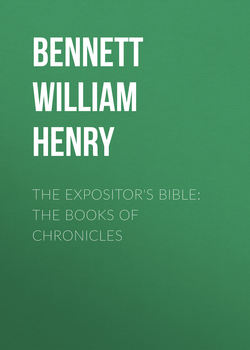Читать книгу The Expositor's Bible: The Books of Chronicles - Bennett William Henry - Страница 2
Book I. Introduction
Chapter I. Date And Authorship
ОглавлениеChronicles is a curious literary torso. A comparison with Ezra and Nehemiah shows that the three originally formed a single whole. They are written in the same peculiar late Hebrew style; they use their sources in the same mechanical way; they are all saturated with the ecclesiastical spirit; and their Church order and doctrine rest upon the complete Pentateuch, and especially upon the Priestly Code. They take the same keen interest in genealogies, statistics, building operations, Temple ritual, priests and Levites, and most of all in the Levitical doorkeepers and singers. Ezra and Nehemiah form an obvious continuation of Chronicles; the latter work breaks off in the middle of a paragraph intended to introduce the account of the return from the Captivity; Ezra repeats the beginning of the paragraph and gives its conclusion. Similarly the register of the high-priests is begun in 1 Chron. vi. 4-15 and completed in Neh. xii. 10, 11.
We may compare the whole work to the image in Daniel's vision whose head was of fine gold, his breast and arms of silver, his belly and his thighs of brass, his legs of iron, his feet part of iron and part of clay. Ezra and Nehemiah preserve some of the finest historical material in the Old Testament, and are our only authority for a most important crisis in the religion of Israel. The torso that remains when these two books are removed is of very mixed character, partly borrowed from the older historical books, partly taken down from late tradition, and partly constructed according to the current philosophy of history.
The date1 of this work lies somewhere between the conquest of the Persian empire by Alexander and the revolt of the Maccabees, i. e., between b. c. 332 and b. c. 166. The register in Neh. xii. 10, 11, closes with Jaddua, the well-known high-priest of Alexander's time; the genealogy of the house of David in 1 Chron. iii. extends to about the same date, or, according to the ancient versions, even down to about b. c. 200. The ecclesiastical system of the priestly code, established by Ezra and Nehemiah b. c. 444, was of such old standing to the author of Chronicles that he introduces it as a matter of course into his descriptions of the worship of the monarchy. Another feature which even more clearly indicates a late date is the use of the term “king of Persia” instead of simply “the King” or “the Great King.” The latter were the customary designations of the Persian kings while the empire lasted; after its fall, the title needed to be qualified by the name “Persia.” These facts, together with the style and language, would be best accounted for by a date somewhere between b. c. 300 and b. c. 250. On the other hand, the Maccabæan struggle revolutionised the national and ecclesiastical system which Chronicles everywhere takes for granted, and the silence of the author as to this revolution is conclusive proof that he wrote before it began.
There is no evidence whatever as to the name of the author; but his intense interest in the Levites and in the musical service of the Temple, with its orchestra and choir, renders it extremely probable that he was a Levite and a Temple-singer or musician. We might compare the Temple, with its extensive buildings and numerous priesthood, to an English cathedral establishment, and the author of Chronicles to some vicar-choral, or, perhaps better, to the more dignified precentor. He would be enthusiastic over his music, a cleric of studious habits and scholarly tastes, not a man of the world, but absorbed in the affairs of the Temple, as a monk in the life of his convent or a minor canon in the politics and society of the minster close. The times were uncritical, and so our author was occasionally somewhat easy of belief as to the enormous magnitude of ancient Hebrew armies and the splendour and wealth of ancient Hebrew kings; the narrow range of his interests and experience gave him an appetite for innocent gossip, professional or otherwise. But his sterling religious character is shown by the earnest piety and serene faith which pervade his work. If we venture to turn to English fiction for a rough illustration of the position and history of our chronicler, the name that at once suggests itself is that of Mr. Harding, the precentor in Barchester Towers. We must however remember that there is very little to distinguish the chronicler from his later authorities; and the term “chronicler” is often used for “the chronicler or one of his predecessors.”
1
Cf. Ezra; Nehemiah; Esther, by Professor Adeney, in “Expositor's Bible.”
